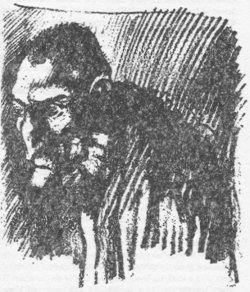
The weather forecasters are threatening us with a winter of low temperatures and severe weather. When the first few flakes of snow begin to fall, the nation is instantly plunged into chaos, the trains cease to run and police warn everyone to stay indoors, it would be as well to remember past winters …
… winters when things were really bad …
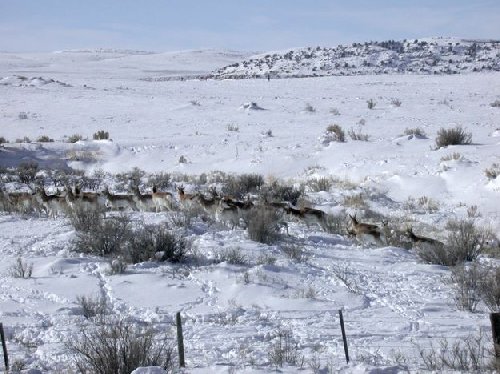
After the Second World War Britain was bombed out, bankrupt, exhausted and desperately short of fuel. The winter of 1947 sank the country to a level of deprivation unknown even during the war. A catalogue of weather calamities precipitated a national crisis and changed Britain and the rest of Europe for decades afterwards.
The winter began deceptively, with just a brief cold snap before Christmas 1946. Snow lay thick on the ground when, in mid-January, temperatures soared so high that it felt as if spring had arrived early. The snow thawed so rapidly that it set off floods - just as hurricane-force winds brought down roofs, trees and even houses and a railway bridge in Birmingham.
But real winter arrived soon afterwards as the country was gripped in an Arctic freeze that lasted for two months, with snow whipped into monstrous drifts that buried roads and railways. The temperature fell to -21C at Woburn, Buckinghamshire.
On February 20 the Dover to Ostend ferry service was suspended because of pack-ice off the Belgian coast. It became the coldest February ever recorded - and there was virtually no sunshine for almost the whole month.
The freeze paralysed coalmines, with coal stocks often stuck at the collieries by railways and roads buried in snow. Even carrying coal by sea was hazardous, with storms, fog and iced-over harbours.
A week after the freeze began, the Minister of Fuel and Power, Emmanuel Shinwell, ordered electricity supplies to be cut to industry, and domestic electricity supplies to be turned off for five hours each day, to conserve coal stocks. Whitehall and Buckingham Palace were reduced to working by candlelight. Television was closed down, radio output reduced, newspapers cut in size and magazines ordered to stop publishing. The emergency package hardly made a difference to power supplies but was a crushing blow to public morale.
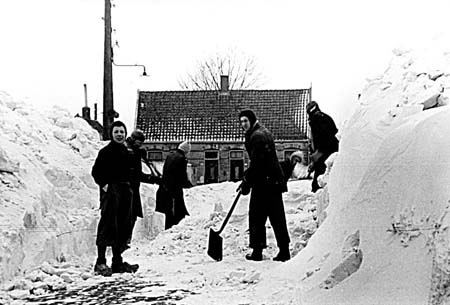
Food supplies shrank alarmingly and rations were cut even lower than they had been during the war. Farms were frozen or snowed under, and vegetables were in such short supply that pneumatic drills were used to dig up parsnips from frozen fields. For the first time, potatoes were rationed after some 70,000 tons of them were destroyed by the cold.
The Government tried a deeply unpopular campaign to encourage everyone to eat a cheap South African fish called snoek, millions of tins of which had been imported - but it tasted disgusting and was used eventually as cat food.
Those delivering food supplies were battling to get through blizzards and snowdrifts, and the Attlee Government was seriously worried that the country could slide into famine.
March turned out even worse than February. March 5 brought the worst blizzard of the 20th century. Supplies of food shrank so low that in some places the police asked for authority to break open stranded lorries carrying food cargoes. On March 6 The Times reported: "The blizzard has virtually cut England in two. It is almost impossible to get from South to North."
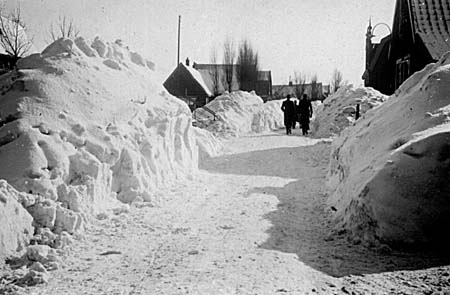
Eventually, on March 10, a sustained thaw set in - and triggered another spectacular disaster. After weeks of deep frost, the ground was so hard that the melting snow ran off into raging torrents of floodwater and, to make things worse, a huge storm dropped heavy rain. Indeed, it was the wettest March on record in England and Wales. The winds whipped up floodwater into waves that breached dykes in the Fens, flooding 100 square miles of rich farmland, and houses collapsed. Canada sent food parcels to stricken villages in Suffolk, and the prime minister of Ontario even offered to help to dish them out.
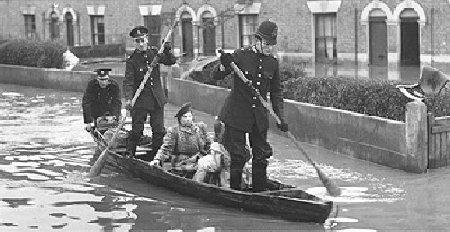
It is difficult to imagine a worse run of weather, although the Government was blamed for the food and fuel crises. Elected in the summer of 1945 with a landslide majority, the Labour administration had embarked on a radical programme of nationalisation, including the health service, coalmining, electricity supply and railways. But it was caught unprepared when people began to buy electric fires and immersion heaters, and power stations could not meet the rising demand for energy.
Yet despite the collapsing economy and threat of starvation, the Government carried on behaving as if it were in control of a world superpower. Military expenditure was 15 per cent of GDP - far higher than before the war - and included the development of Britain's own nuclear bomb, as well as forces stationed in Europe and across the Empire. With a hugely ambitious programme of free healthcare and reconstruction, it was simply unsustainable. The winter of 1947 led to savage cuts in public spending at home and contributed to the humiliating devaluation of sterling from $4 to $2.80 the next year.
Less than two years after winning the war, the nation was left freezing cold, plunged into darkness and on the brink of starvation - and for many people it showed that national planning and socialism did not work.
Labour was turned out of office in a landslide defeat at the next general election.
The GOS says: So it wasn't all bad, then.
This was an extract from "Since Records Began: The Highs and Lows of Britain's Weather" by Paul Simons (Collins, £9.99).
either on this site or on the World Wide Web.
Copyright © 2008 The GOS
This site created and maintained by PlainSite
